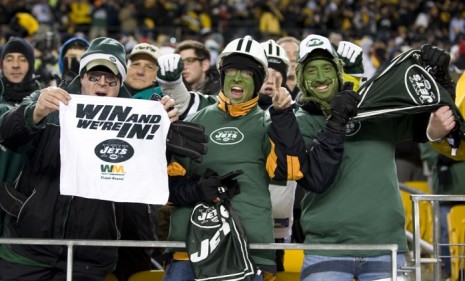Can rooting for the losing Super Bowl team kill you?
A new study suggests that a painful loss on Super Bowl Sunday may be (very) bad for your health

A free daily email with the biggest news stories of the day – and the best features from TheWeek.com
You are now subscribed
Your newsletter sign-up was successful
As Super Bowl Sunday approaches, fans of the Green Bay Packers and Pittsburgh Steelers may want to think twice about investing their entire emotional well-being in the game's outcome. In a study published in the journal Clinical Cardiology last week, researchers found that watching a favorite team lose may lead to an increase in heart attacks — the stress, it seems, "generates the so-called fight-or-flight response, which causes sharp upticks in heart rate and blood pressure." Can rooting too hard for your team really put you at risk? Here's a brief guide to the study:
How was the research conducted?
Robert A. Kloner, a professor of cardiology at USC, examined Los Angeles County data for the two weeks before and after the 1980 and 1984 Super Bowls. Both games involved hometown teams — the Los Angeles Rams, who later moved to St. Louis, and the Los Angeles Raiders, who relocated to Oakland. He and his colleagues also surveyed numbers from the intervening years, when Los Angeles teams failed to make it to the big game.
The Week
Escape your echo chamber. Get the facts behind the news, plus analysis from multiple perspectives.

Sign up for The Week's Free Newsletters
From our morning news briefing to a weekly Good News Newsletter, get the best of The Week delivered directly to your inbox.
From our morning news briefing to a weekly Good News Newsletter, get the best of The Week delivered directly to your inbox.
So do Super Bowls affect heart health?
Kloner says some do. The 1980 championship game was a back-and-forth affair that the Rams lost after the Pittsburgh Steelers mounted a dramatic fourth-quarter comeback. In the two weeks following that heart-stopper of a game, cardiac deaths spiked 15 percent among men and 27 percent among women, compared with the corresponding data for 1981 and 1983. By contrast, the 1984 Super Bowl was a placid affair. The Rams routinely dispatched the Washington Redskins, and the study notes no increase in cardiac deaths over the following two weeks — women and the elderly were actually less likely to suffer heart attacks than usual.
How solid are the study's conclusions?
There are a number of caveats. CNN notes that "Kloner and his colleagues looked only at death-certificate data, not individuals, and they can't be sure that the people who succumbed to heart attacks following the 1980 game were Rams fans, or even watched the game." Barry Petchesky at Deadspin says the findings are likely to be "completely bull" — just another in a long list of supposed Super Bowl effects that have turned out to be falsehoods.
A free daily email with the biggest news stories of the day – and the best features from TheWeek.com
What are other so-called Super Bowl effects?
While it's become accepted wisdom that domestic violence rates go up just after the Super Bowl, the claim was debunked as a hoax more than 15 years ago. Other common misconceptions include the "oft-quoted statistic that more than half of all avocados purchased in this country are eaten on Super Bowl Sunday" (in fact, it's more like 3 percent) and an unfounded theory that millions of Super Bowl viewers all taking a bathroom break at halftime could overwhelm sewage systems. The cardiac study may prove the theory that "if you repeat a fun fact enough, people start to believe it, even if it's more fun and less fact."
Have other health risks been linked to Super Bowl Sunday?
Besides the latest heart-attack study, there's also the danger of excessive eating, which goes hand in hand with the Super Bowl. According to The Wall Street Journal, a 2000 study found that "a huge meal — and the activities that may accompany it, such as drinking and smoking — can quadruple the odds of a heart attack in the two hours following the meal." The WSJ also notes that a 2003 letter to the New England Journal of Medicine "reported a 41 percent relative increase in the average number of driving fatalities" that occur just after the Super Bowl.
Sources: CNN, Deadspin, Wall Street Journal, Boston.com